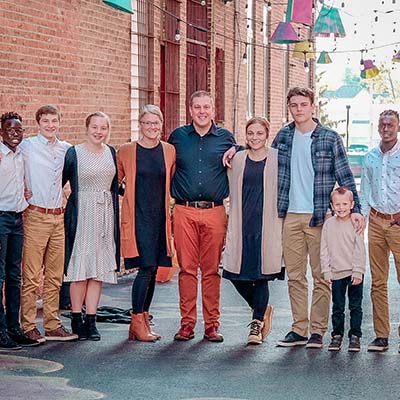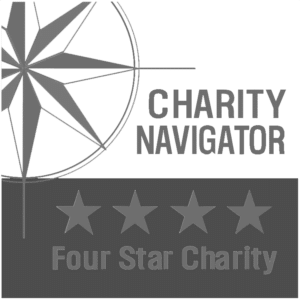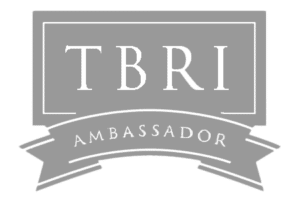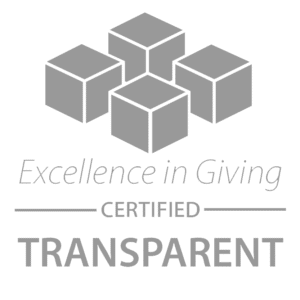You’re listening to Together by AGCI. I’m Marisa Butterworth.
Today, I get to speak with a new friend of mine, Erica Manz. Erica’s story is an amazing one and shared with her best friend and husband, Chris. She is mom to seven amazing kids and is currently in process to adopt their eighth child, a son or daughter from Haiti. She loves to travel and see the world but Ethiopia holds her heart. Most importantly, Erica loves Jesus and hopes that by sharing her story today, she will bring glory to him. I personally have no doubt that she will. I know her as a fierce advocate for vulnerable children in Ethiopia and an absolutely inspiring adoptive mom. And I am so happy to share her with all of you. Erica! Thank you so much for joining me on the podcast today. Thank you so much for having me. It’s good to be here. Yes. I’m so glad to talk to you. I, I have told you this before, but I’m not joking when I say that you’re one of my favorite people to talk to because we get to talk all things adoptive, mom and Ethiopia, and I love hearing about your family and getting to know you better. So I really I’m so excited to have you on here and have everyone else be able to hear from you and your story and, uh, all the amazing things that your family has done. So thank you. Thank you. Thank you.
It’s good to be here. I’m glad to, to join you and to talk with you again, we have a lot of things in common and it’s just fun to talk all things Ethiopia. I think so, too. So, um, if I know anything which I would say the older I get the less I know, but it’s that God makes families and so many beautiful and different ways and your family and extended family are all just incredible. So would you just start us off by sharing a little bit about your story and how your family came together? Sure. I’d love to, um, I think that God has a sense of humor and I’ll just share a little bit. Um, so my husband and I had our fourth child when we were 29 years old and we just looked at each other and said, you know, four is a good number for us. We have two girls and two boys we’ll be empty nesters by the time we’re in our late forties and we can travel the world and do what we want to do. I think four is perfect for us. And I always say that God looked down and laughed and said, okay, we’re going to double back because here we are in the process to adopt our eighth child from Haiti. So, um, we had four biological children and then we adopted twin boys from Ethiopia.
And then we had one more biological son who is six years old now. And we’re in the process of adoption again from Haiti. So I say that, uh, God did take the travel the world part serious, at least. Okay. That will give you, but here we’re going to dump. Yeah, for sure. So our adoption journey really began in 2009 and there were a couple of things that played into that. Um, we had never considered adoption for our family before. Um, it would just, wasn’t something that we thought about. And I guess we were pretty ignorant as to the orphan crisis going on in the world today. We didn’t know that much about it. And then my sister and her husband adopted a little boy from Ethiopia and that just sort of opened our eyes. Um, at the same time we were taking a financial course through our church and we learned that, you know, what we think is ours, isn’t really ours. Everything is God’s and we don’t have control over anything really, as we learned, as we’ve learned through COVID, um, we can make all the plans in the world, but we’re not really in control. And so we learned that our money is really God’s, you know, every good and perfect gift is from him. And so we really decided we wanted to start using our resources more for his kingdom and just started praying about what that might look like.
And, um, I would say it was in the fall of 2009 when I started really feeling led to adoption. Um, God has usually throughout my life has spoken really clearly to me. And I can usually tell which direction he wants me to go. And, um, I was just really feeling led that way. And I talked to Chris and I said, you know, I’m, I’m really feeling like maybe we should start at adoption. Um, but he was not on board. He’s like, no, we have our four kids, you know, weren’t great. What about our plan? Exactly, exactly. But he did start coming home from work every day because I was just getting sign after sign that this, this is where we should be heading. So Chris would come home from work and he would say, so what did God show you today? And I was like, you know, this is not just me. Like, this is not something I can do by myself. We’re in this together. It’s a big deal. It’s really something that’s going to impact our entire family. We need to be on the same page here. So I said, I’m just not going to talk about it anymore for a while. I want you to pray about it and see if you are feeling led the same way that I am. So he’s like, you know, I can’t really ignore it anymore. You have been shown quite a few things.
And um, so he started praying about it and it wasn’t very long and he’s like, yes, you’re right. We need to go ahead and do this. You know, God is not letting me get this out of my mind. So, um, we knew we were supposed to adopt, we didn’t really even know how to go about the process or where to adopt from. So after doing some research and after God clearly showed us that it was to be Ethiopia, we started the application process with all God’s children international and, uh, January of 2010. Okay. So at that point we signed up for one child, a boy or girl ages, zero to three, and we got all of our paperwork done pretty quickly. Um, and we were just waiting on our social worker to write our home study. Okay. So it seemed like it was taking quite a while and we weren’t sure what the holdup was. And all this time I was kind of praying in the back of my mind, like what if we’re supposed to adopt two children instead of one, but I didn’t really feel like that was the thing for us until, and I will never forget the date. It was April 16th, 2010. And it was really early in the morning. And all of a sudden I heard this audible voice that said adoption is no longer one but two. Oh.
And it, it stopped me in my tracks and threw me for a loop. And I started to get this panicky feeling and I was thinking, okay, God, I can know this issue. I’ve never had an experience like this before, where I heard someone talking to me audibly. Um, I know this is you, but what does it mean? Yes, the adoption was no longer one, but two does that mean we’re supposed to adopt two children this time? Does that mean we complete this adoption? And then somewhere down, down the line in the future, there’s another adoption. Like I just, I didn’t know what to do with that. So I went to talk to Chris and I said, you’ll never guess what just happened. You know, what does this mean? What are we supposed to do with this? And he, so wisely said, you know what, let’s contact our social worker and let’s open our parameters to one or two children and then leave it up to God. If we’re supposed to get one, we’ll get one. If we’re supposed to get to we’ll get to. And so I said, yeah, that’s a good idea. So I called the social worker thinking, you know, at this point she probably already has our home study done and it might be a big deal to change it. I didn’t know how that worked.
And so I called her and she said, you know, your home study is the top thing on my pile of stuff to do today. And I will definitely approve you for two children. Wow. So we just kinda knew from that point on, it was going to be to so fast, forward to little bit more than a year later in June of 2011. Okay. We did call, uh, with a referral for twin twin two year old boys, two and a half year old. Wow. So, um, we’re like, we just, we knew it was going to be two. So, um, then August 1st, 2011, we met them for the first time over in Ethiopia. Um, Ethiopia back then had a two trip process where you went first time, spent time with your children, got through the court process. And then you came home, went back again at a future date, um, for your embassy process and to bring them home. So we met them in August, spent a week with them, and then we actually had to go home because we didn’t pass court. Then their court system closes down in Ethiopia, in the fall for the rainy season. Yes. And so we actually left not having any idea when we were going to go back. And that was a hard it’s ended up being three months.
It was hard because we didn’t know when we were going to see our boys again, but it turned out we got a call about three months later, it was in November. And they said, okay, it’s time to go bring your boys home. So I was pretty nervous about this. You know, this is going to completely change our family, adding two more kids. And of course we had spent a week with them and knew that they were very active and twit after all this time, they had actually had, uh, had their birthday in October and had turned three. Um, and so, but that was just another little God story too, in our adoption because throughout my life, um, if I was struggling with something or just needed reassurance about something, it seemed like every time I would look at the clock at 1111, and it was just something small, but it was just God’s little way of saying, you know what? I’ve got this, I’m there for you and everything is going to be okay. Well, it turned out that we left to bring our boys home on November 11th, 2011. So it was 11, 11 of 11. Oh my, I looked at that and I said, thank you, God, you know, you wouldn’t have needed to do that. But it was just a little love note and a reassurance to me that, you know what, Erica, I am in this, I’ve done it before you got this.
And I am preparing the way, so I, um, middle of November then. So I think I got the chills a few times while you’re telling your story. I’m like, oh my gosh. Oh my gosh. That is just incredible. I know it is those little things along the way that, you know, keep you going. And like you said, at the beginning where you realize like, we’ve, we’ve all realized this year that we’d have no control over anything, but there’s nothing like adoption to really, you know, make you understand that. Yeah, I really don’t have anything and lean into the Lord. And, uh, and for me, you know, lots of crying and there things, but it’s hard. It’s hard, but that is incredible. I love hearing all of those details too. And, and just all the ways that God was faithful. And it’s just, it’s like those sweet little reminders, like you said, that he didn’t have to do that. I love so like tell me a little bit about, um, once you decided, okay, Ethiopia is the country that we’re going to proceed with for adoption. Did you know anything about Ethiopia at that time? Was there a learning curve? Did you start then doing research? Um, what did that whole journey look like for your family? So, yeah, it was a little bit of a learning curve. Um, we had never traveled to Ethiopia before. We didn’t know that much about it.
Um, in fact, the picture of Ethiopia that I had in my head was from when I was in grade school. I remember, um, the news about the famine there. And I remember seeing this little picture of a boy and he was starving and he was hunched over and right beside him set this big vulture, that was the picture I had in my mind to be healed. But, um, yeah, we started to integrate Ethiopian culture into our home. And I had a lot of help with that from my sister who by this time had brought her child home for me, Theo BIA. So she sent us all of the pictures and videos that she had taken on their trips so that we were able to see the sights and sounds of Ethiopia. Um, yeah, it was great. She also gave me a CD for our computer that taught us basic words and phrases in Amharic, which is the national language of Ethiopia. So we learned a few words and phrases to help us speak to our children when they got home. Um, also we started collecting children’s books from Ethiopia and just, um, things like that. We decorated the boys room before we brought them home with an African theme. Um, we started trying out Ethiopian food. We would go to traditional restaurants that we would found and try different foods.
So there was a lot of things I felt like we could do while we were in the process, um, to start incorporating that into our family. And then obviously as we started traveling there, um, you know, we started bringing back art, clothing, decorations, leather goods, coffee, jewelry, spices, all things Ethiopian. Yes. No. Yeah. And how did you with your four, you know, or like the original set, your biological four at the top of your, you know, ages? How did you, um, I don’t know how old they were at that point. What did you talk about with them? Uh, you know, going into this, I mean, were you reading those books to them? Were you having them experience the foods and spaces and coffees and that, what did that look like? Yes. We try to do all of that with our children so that they could start becoming familiar with some of the Ethiopian culture as well. Um, we would buy them clothing, they loved their little Africa shirts. And I remember we watched all kinds of, um, adoptive family videos, like gotcha day videos with our kids is what it might be, what it looks like when we meet your brothers and all of this kind of stuff. And they just loved it. They ate it all up. They were so excited to have a sibling from Ethiopia. Yes. And it really, I think it just brings them into the process.
It’s not something where they’re outside of it, looking in, this is something, you know, it’s, it’s like, when you’re you, since you had had biological children, I’m sure you talked about the baby that was growing in your stomach and you know, all of those things, it’s that it’s the same kind of idea that you’re adding that cultural piece onto it. Um, and helping them fall in love with their sibling and all of their siblings, not just the baby or the child, but you know, everything, I love that you guys were so intentional about that. Um, so one of my favorite things about your family as that you all have made traveling to Ethiopia a real priority. So will you tell us about, uh, kind of when that happened, why that happened and what that looked like for you? Sure. So in 2011, um, when we went the first time, we just fell in love. We fell in love with the country and the people there are so beautiful and so friendly. And so family oriented and the culture and the history are so rich and we had never really experienced anything like it before. Um, you know, I had had that picture in my mind of the starving child during the famine, but we were able to see so much more than that. It’s such a vibrant yes happening place. And, um, we were actually able to take our oldest daughter on that trip as well.
Um, she really wanted to go and we thought that that might be a good idea. So she had a garage sale and ended up raising the exact amount of money that she needed for her plane ticket. And she was able to go with us and that trip just really impacted her and really sort of carved in stone. The person that she is today, how old was we were, she was 10 years old. Okay. So, um, while we were there, we were able to see all the work that AGCI was doing. So they not only were serving families through adoption, but they were actually going out into the communities and they had other ministries that they were working to help vulnerable children. And so we got to go along with them to one of these other outreach places. And we were so impressed with the work that they were doing there. And so that just kind of stuck in our minds. Then in 2013, we were given the opportunity to go back to GAM Bella Ethiopia, which is where our boys were born. Okay. That’s their birth town. And then also the first orphanage that they lived at and we thought we can’t pass up this opportunity. We want to go see, you know, where they’re from and the place that they lived at. And just to have those pictures would mean so much later on. And so we went on that trip.
We took, um, well, Shayna had begged if she could go back with us again, cause she loved it so much. So we took our oldest daughter and our oldest son this time. And he was about 10 years old at this point. So we spent a week in GAM, absolutely loved it. It was such a great experience for us. And that’s when I think it just became a part of us. And we knew that moving forward, this is going to be a part of who we are. And we just really wanted to go back. We developed relationships with the AGCI staff over there and with some other people. And we thought, you know, we just want to try and go back as often as we can to give our support to the incredible staff there and all the people on the ground there who work every day to better the conditions for vulnerable children. And so we just decided, you know what, we, we want this to be a part of our future. So, um, over the years we’ve gone back, we’ve taken all of our kids at this point have been back to experience their, um, their brothers culture and birth country. And then, um, it’s, it’s neat too, because like, obviously I haven’t traveled there for awhile because of COVID, COVID kind of shut us down as all out. It hasn’t been there for two and a half years now.
And it just feels like a part of me is missing. I’m not quite complete anymore, but even though we weren’t able to go this summer, we actually had a friend from Ethiopia and his daughter who came to spend time with us. They came here on vacation and they spent a week with us here in Ohio. So it was just neat to have another little part of Ethiopia here in Ohio, in our home. It’s the best, it’s the next best thing to be in there. Oh my gosh. I love that. So do you think that it has, I mean, I think I know the answer to this, but do you think it has made an impact in your boy’s life, your Ethiopian boy’s life to be able to personally experience their own culture and birth country and, and be there? What does that look like for them? Uh, definitely. Um, they know that we have made it a priority and so, you know, just to keep their, their country and their culture alive in our family. And so I think it will mean even more to them as they continue to grow and get older, but they love all things, Africa they’re just drawn to it. And so we just, we love to celebrate that with them. So, um, they, they know that they have two families who love them.
Um, and actually in 2018, in the summer of 2018, we were able to take them back to GAM Bella, to meet their birth family and to experience their culture where they were born. And that was such a neat experience for them. Um, even though they had not been there in seven or eight years, um, it was amazing as we got to their birth, family’s home, the number of people and family and friends from the community who turned out to welcome them was just incredible. And, um, they just, they just felt so special. And as we would walk down the street in down-ballot, people would recognize them and they would say, oh, yo, Ooh, Chon, which are there given birth names. And at one point, one of my boys said, you know, I feel famous here. This is really cool. Oh, I love that. Even when we got back to the airport to fly from Gambell back to Addis Ababa and one of the security guards, she came up to us and she said, are you OPO and UConn? And they said, yes, she remembered them. She had been a friend to their birth mom and she wanted her picture taken with them. So we were able to get that. And it just, it made such an impression on them. They just felt such a sense of belonging.
You know, they have their friends and family here, but they also have friends and family there and they just feel a belonging. I let a sense of relationship, which I think is really neat. So actually it’s our hope if things with COVID and everything settled down, that we can take them back again this summer. Yeah. And, um, my sister adopted a second little boy from Ethiopia. He is also from GAM Bella. Um, and she would love to take him back. And so I think it’ll just be a neat trip if we can take cousins back together to experience their culture together together. Oh my gosh. I’m like all choked up over here. Like, oh, don’t cry on the podcast. It’s good people. Can’t see. I’m the ugliest crier here. That’s the most beautiful, wonderful thing. And I think that’s what we all hope and dream for, for our kids to feel that sense of belonging in both places. I think that’s the goal of all of this that we can give them that, uh, you know, and you know, it’s not going to be everybody’s story that looks like that, of course, but, you know, but that’s, if you didn’t step out in that and invest in that, that wouldn’t have happened, that’s such a huge gift, uh, to them and to your family, to be able to be a part of that.
So tell me, your family is amazing with like all of the traditions you’re so engaged. What kind of, um, family traditions do you guys have? The man’s family that reflect Ethiopian culture? So we definitely, um, try to and celebrate the holidays. January 7th is Ethiopian Christmas. And so we keep our Christmas decorations up extra long past everybody else so that we can celebrate our Christmas and then Ethiopian Christmases. Well, um, we like to cook food. Um, my boys will still tell you that injera and Shiro are their favorite foods on the delicious yes they are. So we try to make traditional dishes or, um, order takeout from an Ethiopian restaurant. Like I said before, it’s really neat that we have that our boys have cousins that are also from Ethiopia. So some of these things we can share in with them and experience the culture together. We also have a family that lives close to us that have four children from Ethiopia. Um, that one of them is actually, um, my boys, his age, and he’s from gamma Bella as well. So they love to get together, spend time together. They had us over this summer, um, for a traditional meal and they have an older adopted daughter from Ethiopia. It’s still remembers how to do the coffee ceremony and everything. So we had a traditional coffee ceremony and it was just really neat to be able to experience that.
And then this isn’t really a tradition, although I wish it could become one. Um, so one year in the summer in Louisville, Kentucky, we had a GAM Bella adoptive family gathering. So in Ohio and Northern Kentucky, there’s quite a few kids from Gambell. And so we all got together, spend the weekend together. Um, some of these kids have lived at the orphanage at the same time and were able to reunite and, uh, make those friendships again. So that was really neat, but I would say probably our main tradition of something that we try to do yearly is just going back to Ethiopia. I realized not everyone can do that for us, but for our family, it’s been a real blessing. Yes. Oh definitely. And yeah, for sure not everyone can do that, but I think if anything, it should spur you on no matter where your child’s from to like invest in that for their future. Maybe it won’t be every year, but being able to invest first in the traditions of, you know, make the holidays and figuring out what that looks like, how people celebrate and, and, and incorporating that into your family. And then, you know, taking the next step to say, okay, this is something that’s important to us. This is how our family looks. We’re not, we don’t look maybe like what a more, I don’t know.
I don’t even want to say traditional, but you know, we, we don’t look like every other family and there’s so much beauty in that. And so, you know, what, what can we do? And I think B trying to get your kids to their country of origin is so important if you can. So I just, I think that’s so inspiring and I love that that you, but your whole family is a part of this. This isn’t just there. Like, this is your country. You do your own thing. This is all of this is Ethiopia is a part of all of your hearts. And I mean, I think you guys, I think everybody in Ethiopia would consider you to be honorary Ethiopians. So that’s the goal, right? Well, I think, um, somebody told my daughter one time, once you’ve been there, is it nine or 10 times? You’re considered hobby shop, which is traditional Ethiopian. And I have been there nine times now. So if that’s an on my test, that’s the measure. It’s, it’s official. I think you can claim it now. I’m not quite there yet, but I have goals now. So, um, like I know that your entire family loves, like I just said, they all love Ethiopia.
It changed your oldest daughter’s life back when she was 10, like, are your, um, your daughter’s okay with me, like mentioning with they’re up to right now because they are inspiring and I love their hearts and their business minds and what they’re doing. Are they okay with you saying something you can totally say no, yes. I told them I was going to say, okay, or not there, they’re just going to happen. Yes. I’ll just, I’ll give a shameless plug for their businesses. So that’ll help. So, yeah, Shana, when she was 10, she went with us to Ethiopia. First time fell in love with it. And she came home from that trip and she said, mom, I know what I want to do with my future. I want to help people. So she, um, she actually graduated at 19 years old with her bachelor’s degree in social work. And she’s now a full-time social worker. She is taking MBA classes in business, and she has started an internet, an international business with her cousin Darcy, um, who actually went with us to Ethiopia in 2019 and fell in love. They have started a business called Arabia. It’s a R a Y a, which is an Amharic word that means to lead by example. So they have a Raya, ello.com is their business. And what they do is they partner with Ethiopian entrepreneurs and small business owners. They import Ethiopian products like coffee, avocado, oil Alovera.
And then they turn that into a skincare products over here, um, on their website, you can actually order like a monthly subscription box and for every subscription box that they sell, they donate a portion of the proceeds back to buy hygiene items for girls who live in an orphanage in Addis Ababa. So she’s, she’s on her second year now I believe of Amharic lessons. So, um, so that, that can help her in her business. So we get to hear Amhara words and phrases thrown around our house quite a bit. So that’s always fun. And we always have big boxes of coffee and avocado oil and all the Riviera sitting around her house, all the good stuff. So, yeah, that’s Shane I, and then our youngest daughter, Malia, she went with us the first time. Um, in 2016, actually, we were there over her 10th birthday. And, um, we were up in Mechelen, which is in the Northern region of Ethiopia at a school there and all the school children happy birthday to her. And then she was able to sit in on a class of some of the younger kids and teach them some English words. So that was a lot of fun for definitely a birthday. She won’t forget. But then she went back with us in the summer of 2019, and that trip really impacted her.
She met so many amazing kids and she just had such a burden on her heart for them when we got home. And so she started a little business called prayer buddies and she would take a child in Ethiopia and match them up with somebody here in the United States to pray for them. She would give the person the child’s name, a photo, their age, all the information she had about them so that this person could pray for them. And she’s now matched up. I think she told me last night, over 250 were buddies. And then, um, she decided she wanted to go back again to meet the boys birth family. So she started making and selling key chains and t-shirts and hats and, um, sweatshirts and things like that. Once she raised the goal that she was trying to get to now 100% of the proceeds go back to AGCI for, um, to help vulnerable children in Ethiopia. Wow. So both of my girls, um, that’s what they’ve got going on there. And she’s 15 years old now. I mean, has her own nonprofit business. That is just incredible. And I just love that. I mean, this is why I wanted to have you on, because it’s such a huge example of what a, what a family can do and what, um, what it looks like to truly love where your children come from.
And I think it’s so important and I think we’re all fighting for that. We’re all trying to figure out in our own ways, but it’s inspiring to hear, you know, different ways that different people do it and how God uses people and their giftings in different ways, um, to make this, I don’t know, to bless the world in these different avenues that your girls have gone down and they’re just incredible. I’ve met them. And I think they’re pretty, they’re kind of powerhouses. All of you guys are. I just, it’s so cool to see. So I hope this is encouraging to anyone listening, that there are different ways. There are different things, but I think it is important to try to get your family to their country, to your child’s birth country again. And it won’t look the same. I wouldn’t have any expectations. Uh, you know, this is the man’s family story and your story’s going to be something different and beautiful and, you know, look like its own thing, but making that a priority. And in the meantime, if you can’t go right away, if you’re saving, you know, bringing those traditions and, uh, you know, your, your child’s birth country to traditions into your own home is so important and something that all of us can do right now. So I love that.
Thank you so much, Erica, for coming on here and talking to me and sharing your wisdom and stories and just even, um, I’m so encouraged just from all the God moments and those he’s in anyone who’s in process right now, he’s in it with you. I think it’s so encouraging on that end, just to know like, Hey, I thought you, and he loves you. And he’s going to show you in his own sweet, beautiful ways, how much he loves you and how much he loves your children and whoever it is that you’re adopting. He’s got this. He’s going ahead of you. I love that message. So thank you, Erica. Thank you. It was my pleasure.
Thanks for listening to Together by AGCI. That was Erica, adoptive mom and advocate. If you liked what you heard today, please share our podcast. You can also go on and rate and review us wherever you listen to podcasts. If you’d like to read or watch even more stories or learn about the work that we do at AGCI, go to our website at www.allgodschildren.org, reach out to us and let us know what you think on Instagram at @allgodschildren. I hope that you go about the rest of your day as inspired as I. Thank you for this week.










